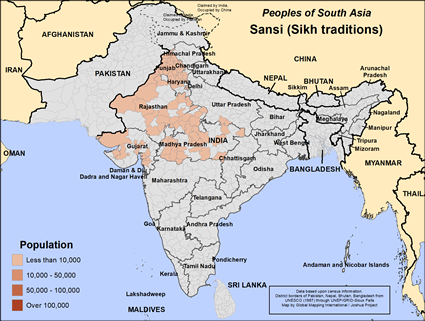Sansi (Sikh traditions) in India

Send Joshua Project a photo
of this people group. |

Map Source:
People Group data: Omid. Map geography: UNESCO / GMI. Map Design: Joshua Project
|
| People Name: | Sansi (Sikh traditions) |
| Country: | India |
| 10/40 Window: | Yes |
| Population: | 71,000 |
| World Population: | 71,000 |
| Primary Language: | Punjabi, Eastern |
| Primary Religion: | Other / Small |
| Christian Adherents: | 0.00 % |
| Evangelicals: | 0.00 % |
| Scripture: | Complete Bible |
| Ministry Resources: | Yes |
| Jesus Film: | Yes |
| Audio Recordings: | Yes |
| People Cluster: | South Asia Sikh - other |
| Affinity Bloc: | South Asian Peoples |
| Progress Level: |
|
Introduction / History
The known history of the Sansi dates to their defeat in the Mughal Wars, which took place between the 1500s and the 1700s. When they lost their lands in these wars, the Sansi began to roam northern India and became known as a wandering community. They were forced to beg for food. To survive, some adopted habits such as stealing and cattle rustling, and became known as criminals during colonial days. The Sansi people were under the Criminal Tribes Act during the British rule of India, and it was a source of disgrace for their community. That stigma is with them today making life difficult for them. In 1952 they were released from this stigma, at least on the government record books. They are sometimes shunned by other communities, giving them a reason to withdraw from outsiders.
Most Sansis are Hindu, but there are some Sikhs among them. They live scattered throughout northwestern India, especially Punjab.
What Are Their Lives Like?
Some of the Sansi are landless farmers and day laborers while others sell alcoholic drinks. Some of their children work in shops. A small number are nomadic. Unfortunately, most of the Sansi live in poverty. They have a low literacy level, so the gospel will need to be presented in oral form. They are secluded from other communities partly because they are rejected as criminals, and partly as a way of defending themselves from outsiders. They have a caste council to look after their needs and to settle disputes among them. Government designs to settle them in one place have been thwarted by their continual habit of selling or bartering any land that is given to them.
What Are Their Beliefs?
Sikhism originated from a 15th century teacher named Guru Nanak Dev as a reform movement. He rejected the Hindu caste system, taught that all people were equal and that all have equal access to God. The Sikh God is formless, without gender and is to be found in everyone. One gets closer to God by living a good life and by practicing charity. Like Hindus, Sikhs believe in reincarnation and the law of karma; you reap what you sow in your previous life. Like Muslims, the Sikhs worship only one God.
One may recognize a Sikh man by his distinctive turban. All the 10 great Sikh gurus wore turbans. Sikh teaching mandates that a person not cut his or her hair. They worship their holy book, the Granth Sahib, which is a collection of hymns.
There are roughly the same number of Sikhs as there are Jews in the world, but Sikhs are most concentrated in Punjab, their homeland. However, you will find smaller numbers of Sikhs all over the world. Many of the best Indian restaurants in the West are owned and operated by Sikhs.
What Are Their Needs?
The Sansi people need opportunities to get better education so they can improve their economic lives.
Prayer Points
Pray for a move of the Holy Spirit to transform Sansi communities so that they will be productive and joyful in their work.
Pray that the Lord will call workers as gentle as doves but as sly as foxes to be able to identify with the Sansi people and share the way to eternal and abundant life with these precious black sheep.
Pray for spiritual hunger and discernment among Sansi people.